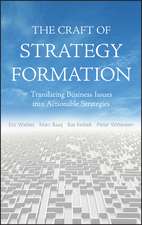The Effect of Managerial Experiences on Strategic Sensemaking: Research in Management Accounting & Control
Autor Daniel Kauer Cuvânt înainte de Utz Schäfferen Limba Engleză Paperback – 24 ian 2008
Din seria Research in Management Accounting & Control
-
 Preț: 386.99 lei
Preț: 386.99 lei - 15%
 Preț: 439.56 lei
Preț: 439.56 lei -
 Preț: 353.61 lei
Preț: 353.61 lei - 15%
 Preț: 442.48 lei
Preț: 442.48 lei - 15%
 Preț: 438.88 lei
Preț: 438.88 lei -
 Preț: 451.65 lei
Preț: 451.65 lei -
 Preț: 383.12 lei
Preț: 383.12 lei -
 Preț: 384.86 lei
Preț: 384.86 lei -
 Preț: 383.33 lei
Preț: 383.33 lei -
 Preț: 383.12 lei
Preț: 383.12 lei -
 Preț: 385.62 lei
Preț: 385.62 lei -
 Preț: 387.75 lei
Preț: 387.75 lei - 15%
 Preț: 497.64 lei
Preț: 497.64 lei - 15%
 Preț: 443.46 lei
Preț: 443.46 lei -
 Preț: 447.84 lei
Preț: 447.84 lei -
 Preț: 383.93 lei
Preț: 383.93 lei - 15%
 Preț: 442.98 lei
Preț: 442.98 lei - 15%
 Preț: 473.99 lei
Preț: 473.99 lei - 15%
 Preț: 441.51 lei
Preț: 441.51 lei - 15%
 Preț: 472.04 lei
Preț: 472.04 lei -
 Preț: 483.70 lei
Preț: 483.70 lei - 15%
 Preț: 526.18 lei
Preț: 526.18 lei
Preț: 384.48 lei
Nou
Puncte Express: 577
Preț estimativ în valută:
73.58€ • 76.62$ • 62.19£
73.58€ • 76.62$ • 62.19£
Carte tipărită la comandă
Livrare economică 10-24 martie
Preluare comenzi: 021 569.72.76
Specificații
ISBN-13: 9783835006300
ISBN-10: 3835006304
Pagini: 276
Ilustrații: XVII, 257 p.
Dimensiuni: 148 x 210 x 17 mm
Greutate: 0.33 kg
Ediția:2008
Editura: Gabler Verlag
Colecția Gabler Verlag
Seria Research in Management Accounting & Control
Locul publicării:Wiesbaden, Germany
ISBN-10: 3835006304
Pagini: 276
Ilustrații: XVII, 257 p.
Dimensiuni: 148 x 210 x 17 mm
Greutate: 0.33 kg
Ediția:2008
Editura: Gabler Verlag
Colecția Gabler Verlag
Seria Research in Management Accounting & Control
Locul publicării:Wiesbaden, Germany
Public țintă
ResearchCuprins
Cognitive Theory — The Theoretical Foundation of Strategic Sensemaking.- Strategic Sensemaking Theory.- Research Design.- Results: Experience as an Influencing Factor of Strategic Sensemaking.- Implications and Outlook.
Notă biografică
Dr. Daniel Kauer promovierte bei Prof. Dr. Utz Schäffer am Lehrstuhl für Controlling der European Business School, Oestrich-Winkel. Er ist als Unternehmensberater tätig.
Textul de pe ultima copertă
In order to survive in increasing environmental turbulence and uncertainty in the business context, organizations have to reconsider and revise their strategies frequently. But not all of them manage to detect and interpret environmental changes and, if necessary, react adequately.
Based on 50 interviews with top managers, Daniel Kauer studies the effects of managerial experiences on the strategic sensemaking of top management teams. He shows that it is very important to distinguish between the depth and breadth of managerial experience, as these discrete dimensions have different effects on strategic sensemaking on the individual as well as on the organizational level. While diversity represents a team’s potential to be successful in strategic sensemaking, the team must realize this potential through effective interaction. Therefore, the author also analyzes decisive interaction factors and describes how teams can best leverage their members’ experience.
Based on 50 interviews with top managers, Daniel Kauer studies the effects of managerial experiences on the strategic sensemaking of top management teams. He shows that it is very important to distinguish between the depth and breadth of managerial experience, as these discrete dimensions have different effects on strategic sensemaking on the individual as well as on the organizational level. While diversity represents a team’s potential to be successful in strategic sensemaking, the team must realize this potential through effective interaction. Therefore, the author also analyzes decisive interaction factors and describes how teams can best leverage their members’ experience.















